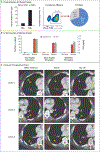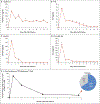Neoantigen T-Cell Receptor Gene Therapy in Pancreatic Cancer
- PMID: 35648703
- PMCID: PMC9531755
- DOI: 10.1056/NEJMoa2119662
Neoantigen T-Cell Receptor Gene Therapy in Pancreatic Cancer
Abstract
A patient with progressive metastatic pancreatic cancer was treated with a single infusion of 16.2×109 autologous T cells that had been genetically engineered to clonally express two allogeneic HLA-C*08:02-restricted T-cell receptors (TCRs) targeting mutant KRAS G12D expressed by the tumors. The patient had regression of visceral metastases (overall partial response of 72% according to the Response Evaluation Criteria in Solid Tumors, version 1.1); the response was ongoing at 6 months. The engineered T cells constituted more than 2% of all the circulating peripheral-blood T cells 6 months after the cell transfer. In this patient, TCR gene therapy targeting the KRAS G12D driver mutation mediated the objective regression of metastatic pancreatic cancer. (Funded by the Providence Portland Medical Foundation.).
Copyright © 2022 Massachusetts Medical Society.
Figures


Comment in
-
T-Cell Immunotherapy against Mutant KRAS for Pancreatic Cancer.N Engl J Med. 2022 Jun 2;386(22):2143-2144. doi: 10.1056/NEJMe2204283. N Engl J Med. 2022. PMID: 35648709 No abstract available.
-
Targeting Cytotoxic T Cells to Tumor.N Engl J Med. 2022 Jun 2;386(22):2145-2148. doi: 10.1056/NEJMe2204286. N Engl J Med. 2022. PMID: 35648710 No abstract available.
-
Engineered KRAS G12D-Reactive T Cells Show Promise in Pancreatic Cancer.Cancer Discov. 2022 Aug 5;12(8):1833. doi: 10.1158/2159-8290.CD-RW2022-103. Cancer Discov. 2022. PMID: 35686834
-
Neoantigen T-Cell Receptor Gene Therapy in Pancreatic Cancer.N Engl J Med. 2022 Aug 11;387(6):573. doi: 10.1056/NEJMc2208623. N Engl J Med. 2022. PMID: 35947720 No abstract available.
Similar articles
-
Targeting KRASG12V mutations with HLA class II-restricted TCR for the immunotherapy in solid tumors.Front Immunol. 2023 May 23;14:1161538. doi: 10.3389/fimmu.2023.1161538. eCollection 2023. Front Immunol. 2023. PMID: 37287989 Free PMC article.
-
More T cell receptors to the RAScue in cancer?J Clin Invest. 2024 Nov 1;134(21):e184782. doi: 10.1172/JCI184782. J Clin Invest. 2024. PMID: 39484723 Free PMC article.
-
High-affinity oligoclonal TCRs define effective adoptive T cell therapy targeting mutant KRAS-G12D.Proc Natl Acad Sci U S A. 2020 Jun 9;117(23):12826-12835. doi: 10.1073/pnas.1921964117. Epub 2020 May 27. Proc Natl Acad Sci U S A. 2020. PMID: 32461371 Free PMC article.
-
Targeting KRAS for diagnosis, prognosis, and treatment of pancreatic cancer: Hopes and realities.Eur J Cancer. 2016 Feb;54:75-83. doi: 10.1016/j.ejca.2015.11.012. Epub 2015 Dec 28. Eur J Cancer. 2016. PMID: 26735353 Review.
-
KRAS-related proteins in pancreatic cancer.Pharmacol Ther. 2016 Dec;168:29-42. doi: 10.1016/j.pharmthera.2016.09.003. Epub 2016 Sep 3. Pharmacol Ther. 2016. PMID: 27595930 Review.
Cited by
-
Targeting sphingosine 1-phosphate and sphingosine kinases in pancreatic cancer: mechanisms and therapeutic potential.Cancer Cell Int. 2024 Oct 26;24(1):353. doi: 10.1186/s12935-024-03535-7. Cancer Cell Int. 2024. PMID: 39462385 Free PMC article. Review.
-
Identification of an optimal mutant allele frequency to detect activating KRAS, NRAS, and BRAF mutations in a commercial cell-free DNA next-generation sequencing assay in colorectal and pancreatic adenocarcinomas.J Gastrointest Oncol. 2023 Oct 31;14(5):2083-2096. doi: 10.21037/jgo-23-114. Epub 2023 Sep 19. J Gastrointest Oncol. 2023. PMID: 37969845 Free PMC article.
-
Neoantigen-targeted TCR-engineered T cell immunotherapy: current advances and challenges.Biomark Res. 2023 Dec 1;11(1):104. doi: 10.1186/s40364-023-00534-0. Biomark Res. 2023. PMID: 38037114 Free PMC article. Review.
-
Lung cancer immunotherapy: progress, pitfalls, and promises.Mol Cancer. 2023 Feb 21;22(1):40. doi: 10.1186/s12943-023-01740-y. Mol Cancer. 2023. PMID: 36810079 Free PMC article. Review.
-
Targeting Driver Oncogenes and Other Public Neoantigens Using T Cell Receptor-Based Cellular Therapy.Annu Rev Cancer Biol. 2023;7(1):331-351. doi: 10.1146/annurev-cancerbio-061521-082114. Epub 2023 Jan 25. Annu Rev Cancer Biol. 2023. PMID: 37655310 Free PMC article.
References
MeSH terms
Substances
Grants and funding
LinkOut - more resources
Full Text Sources
Other Literature Sources
Medical
Research Materials
Miscellaneous
